Power Transition Theory: US-China and International Law Analysis
VerifiedAdded on 2020/06/06
|9
|3023
|392
Essay
AI Summary
This essay examines power transition theory, as originally articulated by Organski, and its relevance to the evolving relationship between the United States and China. It investigates how the engagement of both nations with international law provides insights into the significance of China's increasing power. The essay focuses on the two key components of Organski's theory: power and satisfaction, to evaluate China's rise in relation to the US's leadership of the international order. The analysis considers China's and the US's interaction with international law and considers China as a potential challenger. The essay argues that China may not be as dissatisfied as Organski suggests, and that a peaceful transition of power is possible. It also emphasizes the importance of both the US and China in ensuring peace and stability, highlighting the role of international regimes such as the UNFCCC and the South China Sea disputes. The essay concludes by considering the potential for a peaceful transition, analyzing China's development speed and level of satisfaction with the current international order.
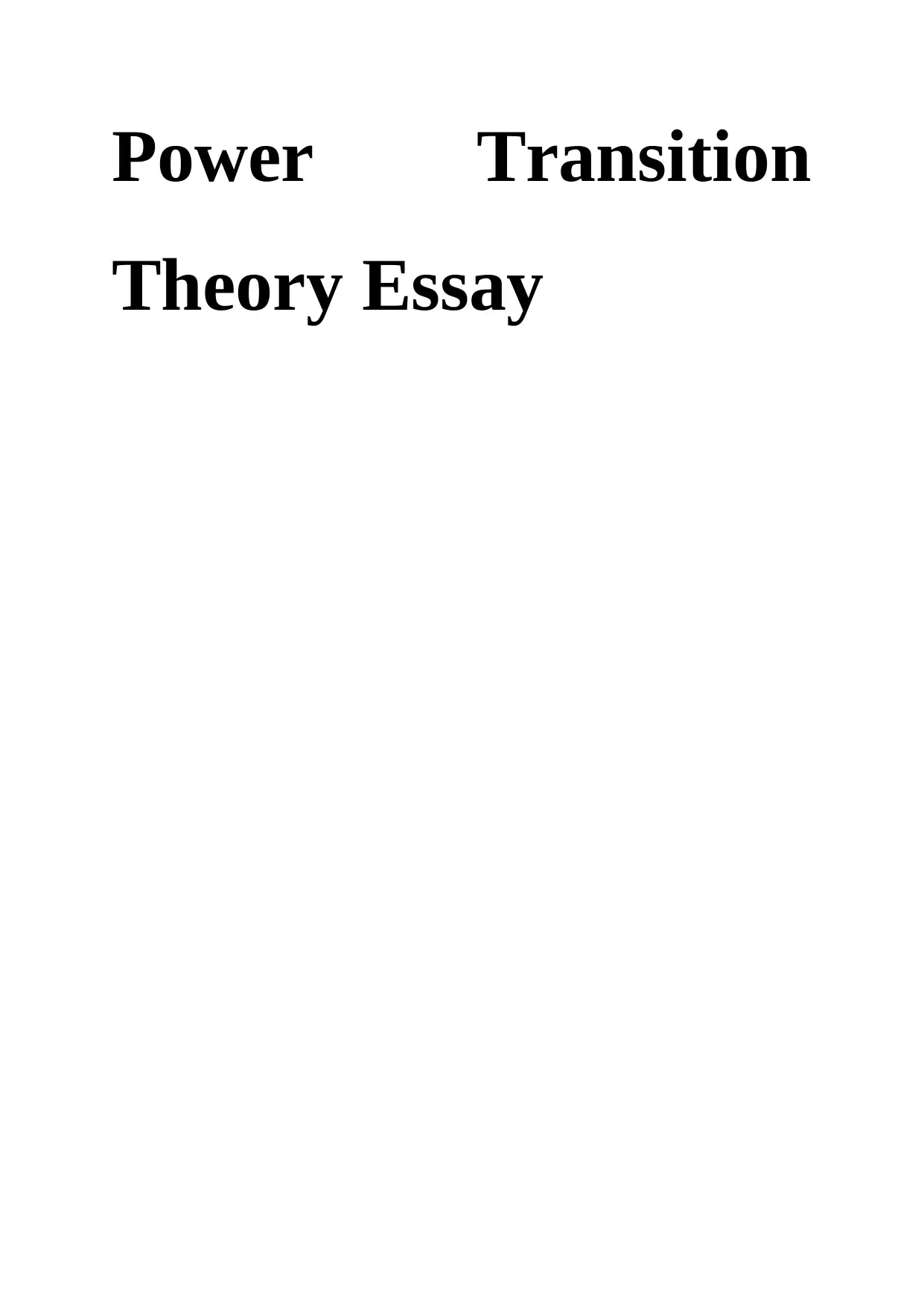
Power Transition
Theory Essay
Theory Essay
Paraphrase This Document
Need a fresh take? Get an instant paraphrase of this document with our AI Paraphraser
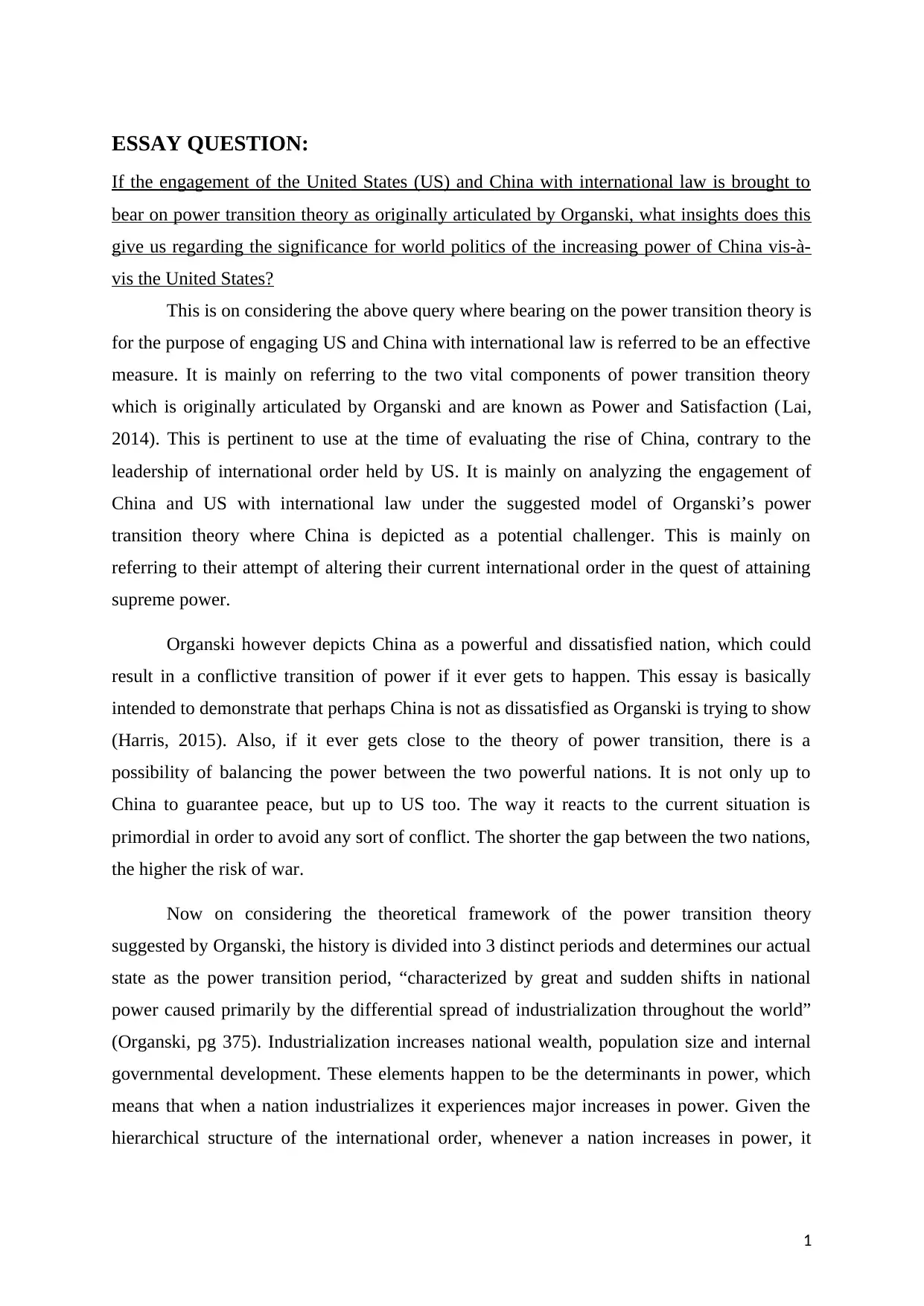
ESSAY QUESTION:
If the engagement of the United States (US) and China with international law is brought to
bear on power transition theory as originally articulated by Organski, what insights does this
give us regarding the significance for world politics of the increasing power of China vis-à-
vis the United States?
This is on considering the above query where bearing on the power transition theory is
for the purpose of engaging US and China with international law is referred to be an effective
measure. It is mainly on referring to the two vital components of power transition theory
which is originally articulated by Organski and are known as Power and Satisfaction (Lai,
2014). This is pertinent to use at the time of evaluating the rise of China, contrary to the
leadership of international order held by US. It is mainly on analyzing the engagement of
China and US with international law under the suggested model of Organski’s power
transition theory where China is depicted as a potential challenger. This is mainly on
referring to their attempt of altering their current international order in the quest of attaining
supreme power.
Organski however depicts China as a powerful and dissatisfied nation, which could
result in a conflictive transition of power if it ever gets to happen. This essay is basically
intended to demonstrate that perhaps China is not as dissatisfied as Organski is trying to show
(Harris, 2015). Also, if it ever gets close to the theory of power transition, there is a
possibility of balancing the power between the two powerful nations. It is not only up to
China to guarantee peace, but up to US too. The way it reacts to the current situation is
primordial in order to avoid any sort of conflict. The shorter the gap between the two nations,
the higher the risk of war.
Now on considering the theoretical framework of the power transition theory
suggested by Organski, the history is divided into 3 distinct periods and determines our actual
state as the power transition period, “characterized by great and sudden shifts in national
power caused primarily by the differential spread of industrialization throughout the world”
(Organski, pg 375). Industrialization increases national wealth, population size and internal
governmental development. These elements happen to be the determinants in power, which
means that when a nation industrializes it experiences major increases in power. Given the
hierarchical structure of the international order, whenever a nation increases in power, it
1
If the engagement of the United States (US) and China with international law is brought to
bear on power transition theory as originally articulated by Organski, what insights does this
give us regarding the significance for world politics of the increasing power of China vis-à-
vis the United States?
This is on considering the above query where bearing on the power transition theory is
for the purpose of engaging US and China with international law is referred to be an effective
measure. It is mainly on referring to the two vital components of power transition theory
which is originally articulated by Organski and are known as Power and Satisfaction (Lai,
2014). This is pertinent to use at the time of evaluating the rise of China, contrary to the
leadership of international order held by US. It is mainly on analyzing the engagement of
China and US with international law under the suggested model of Organski’s power
transition theory where China is depicted as a potential challenger. This is mainly on
referring to their attempt of altering their current international order in the quest of attaining
supreme power.
Organski however depicts China as a powerful and dissatisfied nation, which could
result in a conflictive transition of power if it ever gets to happen. This essay is basically
intended to demonstrate that perhaps China is not as dissatisfied as Organski is trying to show
(Harris, 2015). Also, if it ever gets close to the theory of power transition, there is a
possibility of balancing the power between the two powerful nations. It is not only up to
China to guarantee peace, but up to US too. The way it reacts to the current situation is
primordial in order to avoid any sort of conflict. The shorter the gap between the two nations,
the higher the risk of war.
Now on considering the theoretical framework of the power transition theory
suggested by Organski, the history is divided into 3 distinct periods and determines our actual
state as the power transition period, “characterized by great and sudden shifts in national
power caused primarily by the differential spread of industrialization throughout the world”
(Organski, pg 375). Industrialization increases national wealth, population size and internal
governmental development. These elements happen to be the determinants in power, which
means that when a nation industrializes it experiences major increases in power. Given the
hierarchical structure of the international order, whenever a nation increases in power, it
1
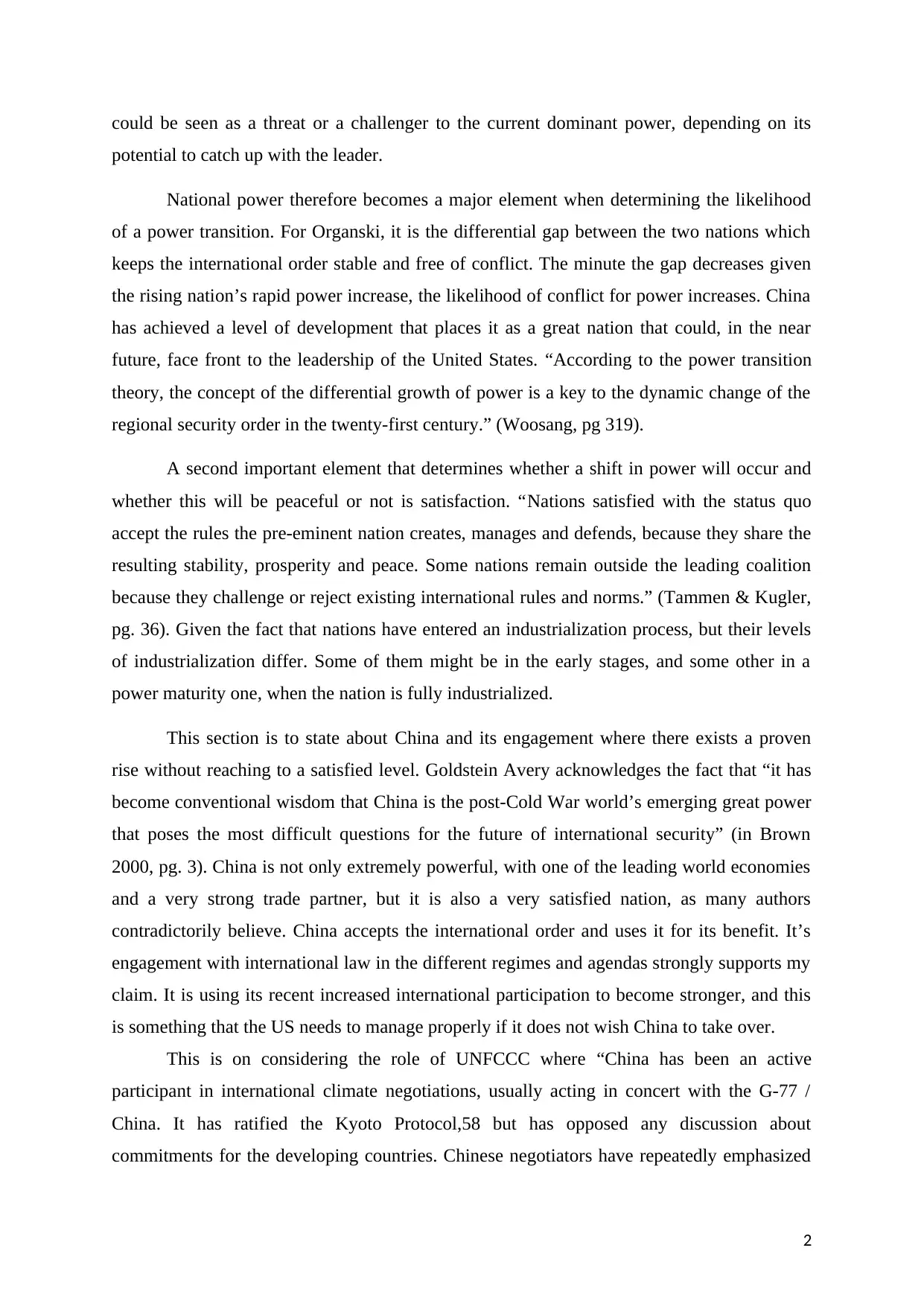
could be seen as a threat or a challenger to the current dominant power, depending on its
potential to catch up with the leader.
National power therefore becomes a major element when determining the likelihood
of a power transition. For Organski, it is the differential gap between the two nations which
keeps the international order stable and free of conflict. The minute the gap decreases given
the rising nation’s rapid power increase, the likelihood of conflict for power increases. China
has achieved a level of development that places it as a great nation that could, in the near
future, face front to the leadership of the United States. “According to the power transition
theory, the concept of the differential growth of power is a key to the dynamic change of the
regional security order in the twenty-first century.” (Woosang, pg 319).
A second important element that determines whether a shift in power will occur and
whether this will be peaceful or not is satisfaction. “Nations satisfied with the status quo
accept the rules the pre-eminent nation creates, manages and defends, because they share the
resulting stability, prosperity and peace. Some nations remain outside the leading coalition
because they challenge or reject existing international rules and norms.” (Tammen & Kugler,
pg. 36). Given the fact that nations have entered an industrialization process, but their levels
of industrialization differ. Some of them might be in the early stages, and some other in a
power maturity one, when the nation is fully industrialized.
This section is to state about China and its engagement where there exists a proven
rise without reaching to a satisfied level. Goldstein Avery acknowledges the fact that “it has
become conventional wisdom that China is the post-Cold War world’s emerging great power
that poses the most difficult questions for the future of international security” (in Brown
2000, pg. 3). China is not only extremely powerful, with one of the leading world economies
and a very strong trade partner, but it is also a very satisfied nation, as many authors
contradictorily believe. China accepts the international order and uses it for its benefit. It’s
engagement with international law in the different regimes and agendas strongly supports my
claim. It is using its recent increased international participation to become stronger, and this
is something that the US needs to manage properly if it does not wish China to take over.
This is on considering the role of UNFCCC where “China has been an active
participant in international climate negotiations, usually acting in concert with the G-77 /
China. It has ratified the Kyoto Protocol,58 but has opposed any discussion about
commitments for the developing countries. Chinese negotiators have repeatedly emphasized
2
potential to catch up with the leader.
National power therefore becomes a major element when determining the likelihood
of a power transition. For Organski, it is the differential gap between the two nations which
keeps the international order stable and free of conflict. The minute the gap decreases given
the rising nation’s rapid power increase, the likelihood of conflict for power increases. China
has achieved a level of development that places it as a great nation that could, in the near
future, face front to the leadership of the United States. “According to the power transition
theory, the concept of the differential growth of power is a key to the dynamic change of the
regional security order in the twenty-first century.” (Woosang, pg 319).
A second important element that determines whether a shift in power will occur and
whether this will be peaceful or not is satisfaction. “Nations satisfied with the status quo
accept the rules the pre-eminent nation creates, manages and defends, because they share the
resulting stability, prosperity and peace. Some nations remain outside the leading coalition
because they challenge or reject existing international rules and norms.” (Tammen & Kugler,
pg. 36). Given the fact that nations have entered an industrialization process, but their levels
of industrialization differ. Some of them might be in the early stages, and some other in a
power maturity one, when the nation is fully industrialized.
This section is to state about China and its engagement where there exists a proven
rise without reaching to a satisfied level. Goldstein Avery acknowledges the fact that “it has
become conventional wisdom that China is the post-Cold War world’s emerging great power
that poses the most difficult questions for the future of international security” (in Brown
2000, pg. 3). China is not only extremely powerful, with one of the leading world economies
and a very strong trade partner, but it is also a very satisfied nation, as many authors
contradictorily believe. China accepts the international order and uses it for its benefit. It’s
engagement with international law in the different regimes and agendas strongly supports my
claim. It is using its recent increased international participation to become stronger, and this
is something that the US needs to manage properly if it does not wish China to take over.
This is on considering the role of UNFCCC where “China has been an active
participant in international climate negotiations, usually acting in concert with the G-77 /
China. It has ratified the Kyoto Protocol,58 but has opposed any discussion about
commitments for the developing countries. Chinese negotiators have repeatedly emphasized
2
⊘ This is a preview!⊘
Do you want full access?
Subscribe today to unlock all pages.

Trusted by 1+ million students worldwide
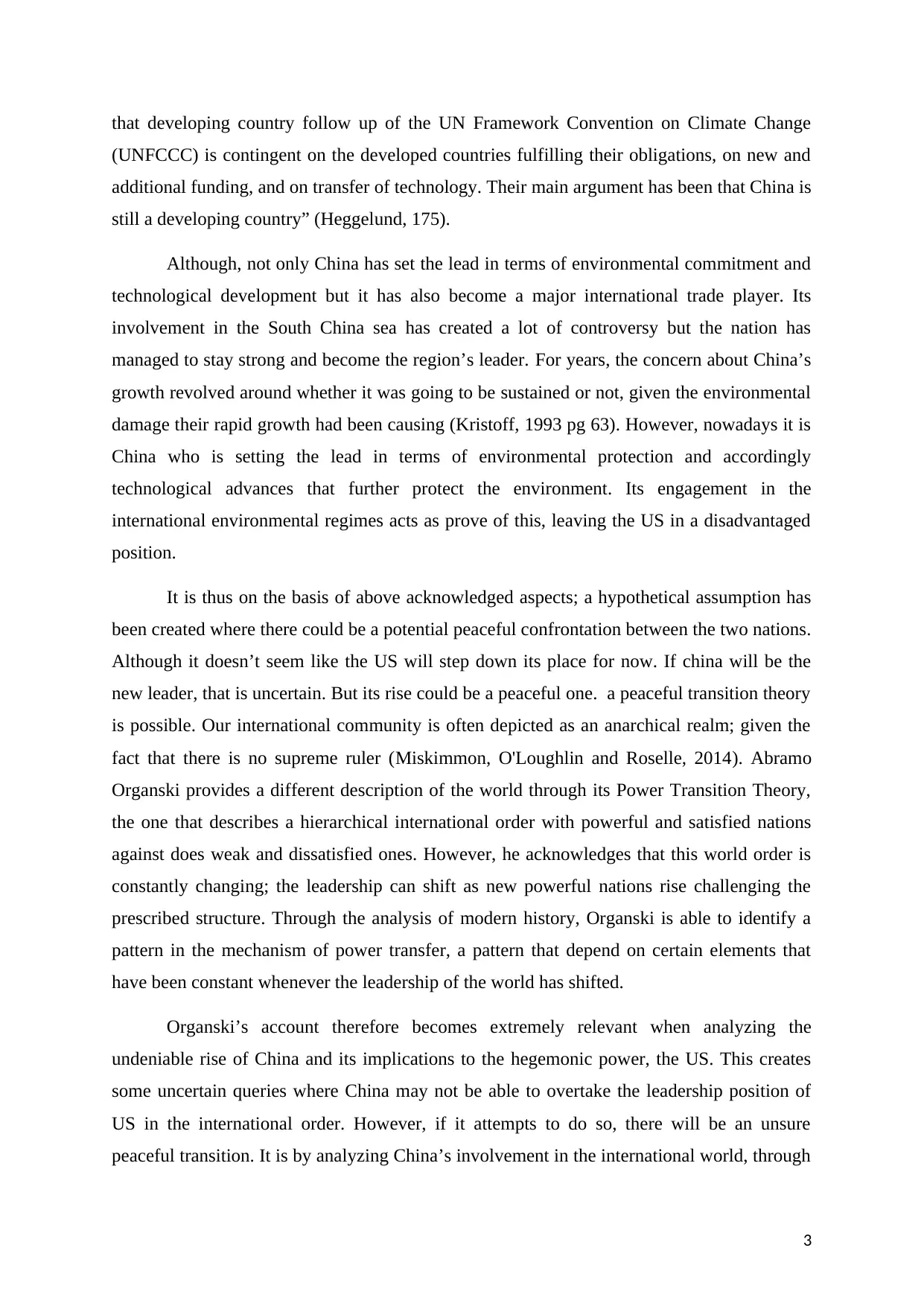
that developing country follow up of the UN Framework Convention on Climate Change
(UNFCCC) is contingent on the developed countries fulfilling their obligations, on new and
additional funding, and on transfer of technology. Their main argument has been that China is
still a developing country” (Heggelund, 175).
Although, not only China has set the lead in terms of environmental commitment and
technological development but it has also become a major international trade player. Its
involvement in the South China sea has created a lot of controversy but the nation has
managed to stay strong and become the region’s leader. For years, the concern about China’s
growth revolved around whether it was going to be sustained or not, given the environmental
damage their rapid growth had been causing (Kristoff, 1993 pg 63). However, nowadays it is
China who is setting the lead in terms of environmental protection and accordingly
technological advances that further protect the environment. Its engagement in the
international environmental regimes acts as prove of this, leaving the US in a disadvantaged
position.
It is thus on the basis of above acknowledged aspects; a hypothetical assumption has
been created where there could be a potential peaceful confrontation between the two nations.
Although it doesn’t seem like the US will step down its place for now. If china will be the
new leader, that is uncertain. But its rise could be a peaceful one. a peaceful transition theory
is possible. Our international community is often depicted as an anarchical realm; given the
fact that there is no supreme ruler (Miskimmon, O'Loughlin and Roselle, 2014). Abramo
Organski provides a different description of the world through its Power Transition Theory,
the one that describes a hierarchical international order with powerful and satisfied nations
against does weak and dissatisfied ones. However, he acknowledges that this world order is
constantly changing; the leadership can shift as new powerful nations rise challenging the
prescribed structure. Through the analysis of modern history, Organski is able to identify a
pattern in the mechanism of power transfer, a pattern that depend on certain elements that
have been constant whenever the leadership of the world has shifted.
Organski’s account therefore becomes extremely relevant when analyzing the
undeniable rise of China and its implications to the hegemonic power, the US. This creates
some uncertain queries where China may not be able to overtake the leadership position of
US in the international order. However, if it attempts to do so, there will be an unsure
peaceful transition. It is by analyzing China’s involvement in the international world, through
3
(UNFCCC) is contingent on the developed countries fulfilling their obligations, on new and
additional funding, and on transfer of technology. Their main argument has been that China is
still a developing country” (Heggelund, 175).
Although, not only China has set the lead in terms of environmental commitment and
technological development but it has also become a major international trade player. Its
involvement in the South China sea has created a lot of controversy but the nation has
managed to stay strong and become the region’s leader. For years, the concern about China’s
growth revolved around whether it was going to be sustained or not, given the environmental
damage their rapid growth had been causing (Kristoff, 1993 pg 63). However, nowadays it is
China who is setting the lead in terms of environmental protection and accordingly
technological advances that further protect the environment. Its engagement in the
international environmental regimes acts as prove of this, leaving the US in a disadvantaged
position.
It is thus on the basis of above acknowledged aspects; a hypothetical assumption has
been created where there could be a potential peaceful confrontation between the two nations.
Although it doesn’t seem like the US will step down its place for now. If china will be the
new leader, that is uncertain. But its rise could be a peaceful one. a peaceful transition theory
is possible. Our international community is often depicted as an anarchical realm; given the
fact that there is no supreme ruler (Miskimmon, O'Loughlin and Roselle, 2014). Abramo
Organski provides a different description of the world through its Power Transition Theory,
the one that describes a hierarchical international order with powerful and satisfied nations
against does weak and dissatisfied ones. However, he acknowledges that this world order is
constantly changing; the leadership can shift as new powerful nations rise challenging the
prescribed structure. Through the analysis of modern history, Organski is able to identify a
pattern in the mechanism of power transfer, a pattern that depend on certain elements that
have been constant whenever the leadership of the world has shifted.
Organski’s account therefore becomes extremely relevant when analyzing the
undeniable rise of China and its implications to the hegemonic power, the US. This creates
some uncertain queries where China may not be able to overtake the leadership position of
US in the international order. However, if it attempts to do so, there will be an unsure
peaceful transition. It is by analyzing China’s involvement in the international world, through
3
Paraphrase This Document
Need a fresh take? Get an instant paraphrase of this document with our AI Paraphraser
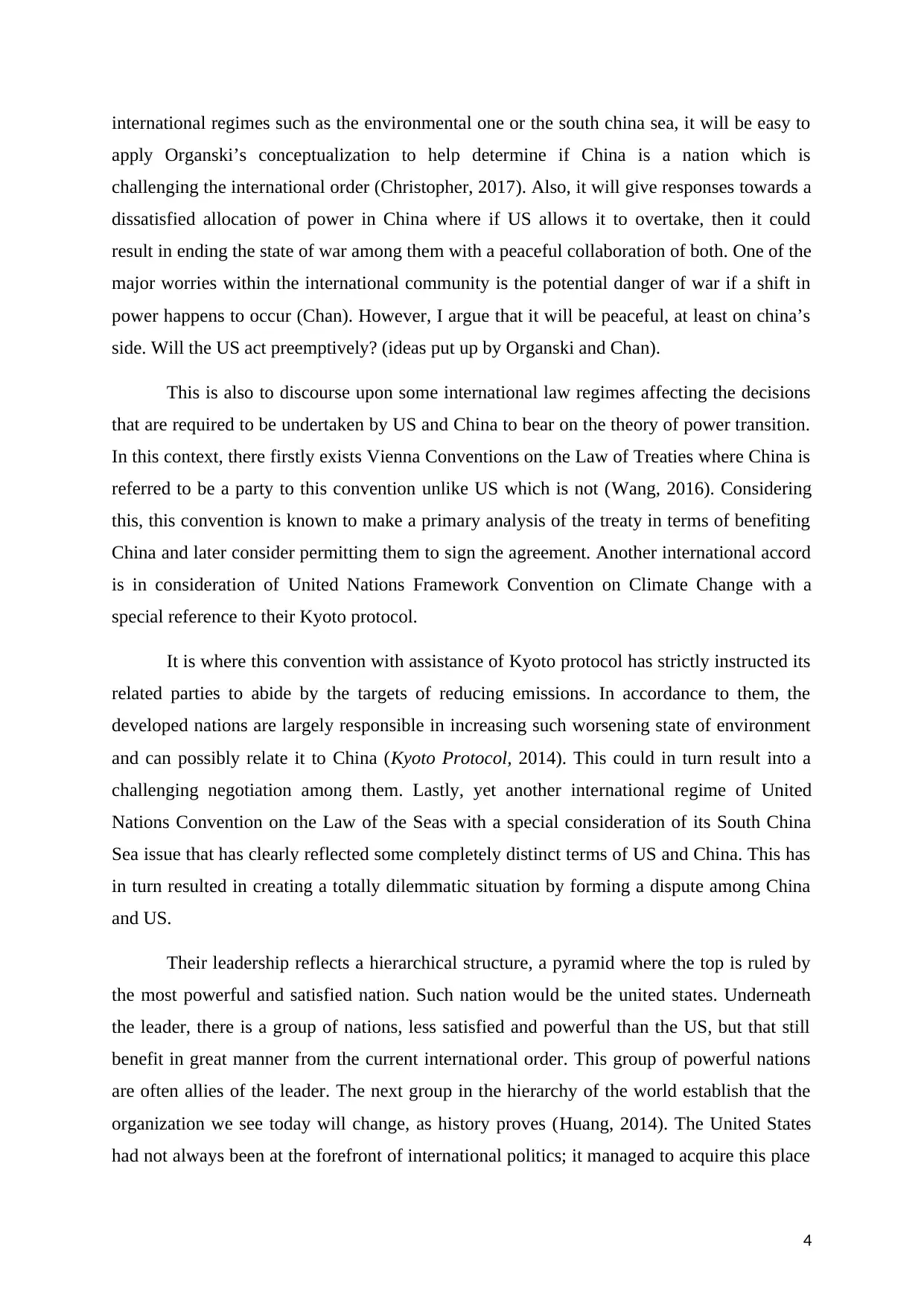
international regimes such as the environmental one or the south china sea, it will be easy to
apply Organski’s conceptualization to help determine if China is a nation which is
challenging the international order (Christopher, 2017). Also, it will give responses towards a
dissatisfied allocation of power in China where if US allows it to overtake, then it could
result in ending the state of war among them with a peaceful collaboration of both. One of the
major worries within the international community is the potential danger of war if a shift in
power happens to occur (Chan). However, I argue that it will be peaceful, at least on china’s
side. Will the US act preemptively? (ideas put up by Organski and Chan).
This is also to discourse upon some international law regimes affecting the decisions
that are required to be undertaken by US and China to bear on the theory of power transition.
In this context, there firstly exists Vienna Conventions on the Law of Treaties where China is
referred to be a party to this convention unlike US which is not (Wang, 2016). Considering
this, this convention is known to make a primary analysis of the treaty in terms of benefiting
China and later consider permitting them to sign the agreement. Another international accord
is in consideration of United Nations Framework Convention on Climate Change with a
special reference to their Kyoto protocol.
It is where this convention with assistance of Kyoto protocol has strictly instructed its
related parties to abide by the targets of reducing emissions. In accordance to them, the
developed nations are largely responsible in increasing such worsening state of environment
and can possibly relate it to China (Kyoto Protocol, 2014). This could in turn result into a
challenging negotiation among them. Lastly, yet another international regime of United
Nations Convention on the Law of the Seas with a special consideration of its South China
Sea issue that has clearly reflected some completely distinct terms of US and China. This has
in turn resulted in creating a totally dilemmatic situation by forming a dispute among China
and US.
Their leadership reflects a hierarchical structure, a pyramid where the top is ruled by
the most powerful and satisfied nation. Such nation would be the united states. Underneath
the leader, there is a group of nations, less satisfied and powerful than the US, but that still
benefit in great manner from the current international order. This group of powerful nations
are often allies of the leader. The next group in the hierarchy of the world establish that the
organization we see today will change, as history proves (Huang, 2014). The United States
had not always been at the forefront of international politics; it managed to acquire this place
4
apply Organski’s conceptualization to help determine if China is a nation which is
challenging the international order (Christopher, 2017). Also, it will give responses towards a
dissatisfied allocation of power in China where if US allows it to overtake, then it could
result in ending the state of war among them with a peaceful collaboration of both. One of the
major worries within the international community is the potential danger of war if a shift in
power happens to occur (Chan). However, I argue that it will be peaceful, at least on china’s
side. Will the US act preemptively? (ideas put up by Organski and Chan).
This is also to discourse upon some international law regimes affecting the decisions
that are required to be undertaken by US and China to bear on the theory of power transition.
In this context, there firstly exists Vienna Conventions on the Law of Treaties where China is
referred to be a party to this convention unlike US which is not (Wang, 2016). Considering
this, this convention is known to make a primary analysis of the treaty in terms of benefiting
China and later consider permitting them to sign the agreement. Another international accord
is in consideration of United Nations Framework Convention on Climate Change with a
special reference to their Kyoto protocol.
It is where this convention with assistance of Kyoto protocol has strictly instructed its
related parties to abide by the targets of reducing emissions. In accordance to them, the
developed nations are largely responsible in increasing such worsening state of environment
and can possibly relate it to China (Kyoto Protocol, 2014). This could in turn result into a
challenging negotiation among them. Lastly, yet another international regime of United
Nations Convention on the Law of the Seas with a special consideration of its South China
Sea issue that has clearly reflected some completely distinct terms of US and China. This has
in turn resulted in creating a totally dilemmatic situation by forming a dispute among China
and US.
Their leadership reflects a hierarchical structure, a pyramid where the top is ruled by
the most powerful and satisfied nation. Such nation would be the united states. Underneath
the leader, there is a group of nations, less satisfied and powerful than the US, but that still
benefit in great manner from the current international order. This group of powerful nations
are often allies of the leader. The next group in the hierarchy of the world establish that the
organization we see today will change, as history proves (Huang, 2014). The United States
had not always been at the forefront of international politics; it managed to acquire this place
4
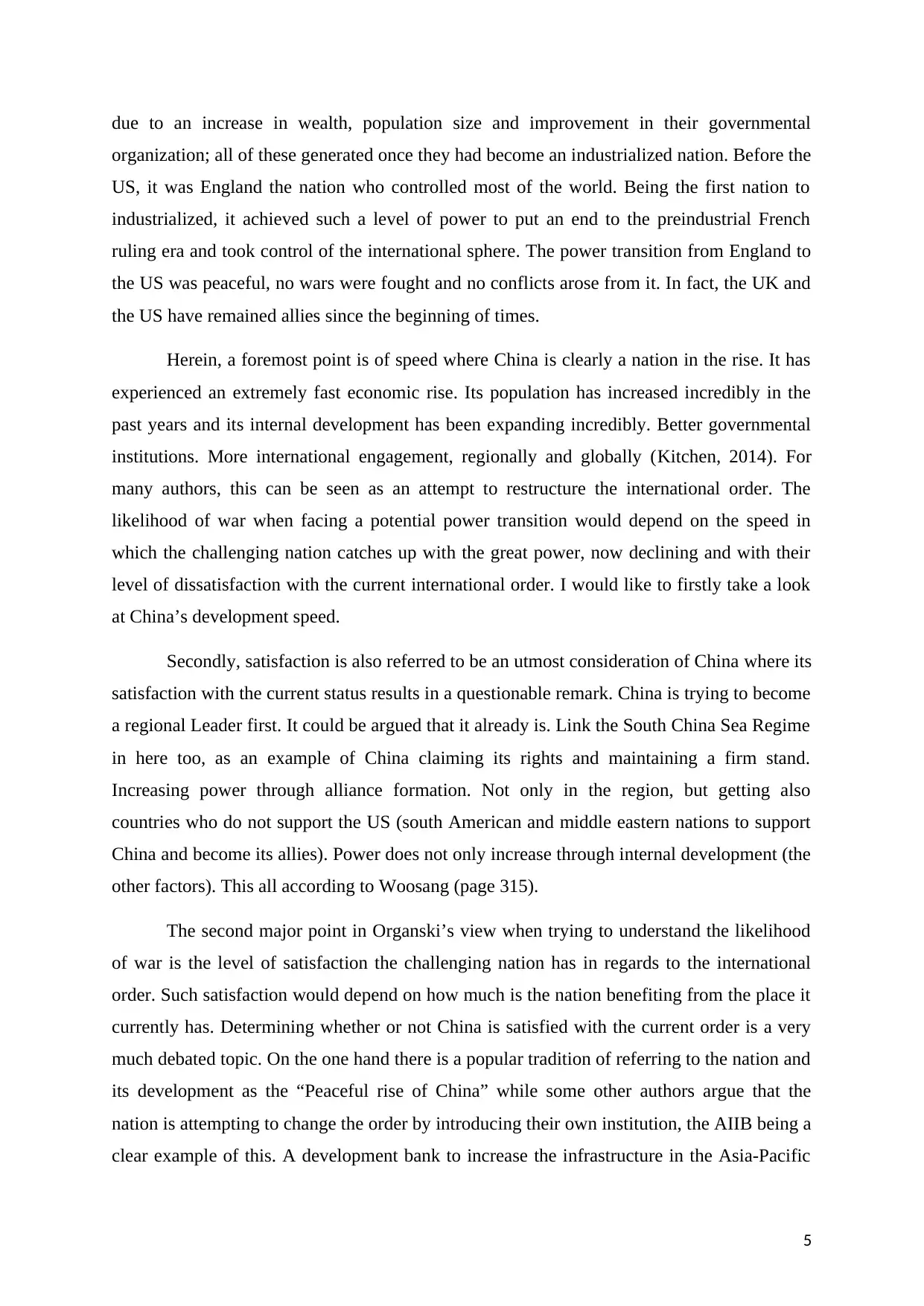
due to an increase in wealth, population size and improvement in their governmental
organization; all of these generated once they had become an industrialized nation. Before the
US, it was England the nation who controlled most of the world. Being the first nation to
industrialized, it achieved such a level of power to put an end to the preindustrial French
ruling era and took control of the international sphere. The power transition from England to
the US was peaceful, no wars were fought and no conflicts arose from it. In fact, the UK and
the US have remained allies since the beginning of times.
Herein, a foremost point is of speed where China is clearly a nation in the rise. It has
experienced an extremely fast economic rise. Its population has increased incredibly in the
past years and its internal development has been expanding incredibly. Better governmental
institutions. More international engagement, regionally and globally (Kitchen, 2014). For
many authors, this can be seen as an attempt to restructure the international order. The
likelihood of war when facing a potential power transition would depend on the speed in
which the challenging nation catches up with the great power, now declining and with their
level of dissatisfaction with the current international order. I would like to firstly take a look
at China’s development speed.
Secondly, satisfaction is also referred to be an utmost consideration of China where its
satisfaction with the current status results in a questionable remark. China is trying to become
a regional Leader first. It could be argued that it already is. Link the South China Sea Regime
in here too, as an example of China claiming its rights and maintaining a firm stand.
Increasing power through alliance formation. Not only in the region, but getting also
countries who do not support the US (south American and middle eastern nations to support
China and become its allies). Power does not only increase through internal development (the
other factors). This all according to Woosang (page 315).
The second major point in Organski’s view when trying to understand the likelihood
of war is the level of satisfaction the challenging nation has in regards to the international
order. Such satisfaction would depend on how much is the nation benefiting from the place it
currently has. Determining whether or not China is satisfied with the current order is a very
much debated topic. On the one hand there is a popular tradition of referring to the nation and
its development as the “Peaceful rise of China” while some other authors argue that the
nation is attempting to change the order by introducing their own institution, the AIIB being a
clear example of this. A development bank to increase the infrastructure in the Asia-Pacific
5
organization; all of these generated once they had become an industrialized nation. Before the
US, it was England the nation who controlled most of the world. Being the first nation to
industrialized, it achieved such a level of power to put an end to the preindustrial French
ruling era and took control of the international sphere. The power transition from England to
the US was peaceful, no wars were fought and no conflicts arose from it. In fact, the UK and
the US have remained allies since the beginning of times.
Herein, a foremost point is of speed where China is clearly a nation in the rise. It has
experienced an extremely fast economic rise. Its population has increased incredibly in the
past years and its internal development has been expanding incredibly. Better governmental
institutions. More international engagement, regionally and globally (Kitchen, 2014). For
many authors, this can be seen as an attempt to restructure the international order. The
likelihood of war when facing a potential power transition would depend on the speed in
which the challenging nation catches up with the great power, now declining and with their
level of dissatisfaction with the current international order. I would like to firstly take a look
at China’s development speed.
Secondly, satisfaction is also referred to be an utmost consideration of China where its
satisfaction with the current status results in a questionable remark. China is trying to become
a regional Leader first. It could be argued that it already is. Link the South China Sea Regime
in here too, as an example of China claiming its rights and maintaining a firm stand.
Increasing power through alliance formation. Not only in the region, but getting also
countries who do not support the US (south American and middle eastern nations to support
China and become its allies). Power does not only increase through internal development (the
other factors). This all according to Woosang (page 315).
The second major point in Organski’s view when trying to understand the likelihood
of war is the level of satisfaction the challenging nation has in regards to the international
order. Such satisfaction would depend on how much is the nation benefiting from the place it
currently has. Determining whether or not China is satisfied with the current order is a very
much debated topic. On the one hand there is a popular tradition of referring to the nation and
its development as the “Peaceful rise of China” while some other authors argue that the
nation is attempting to change the order by introducing their own institution, the AIIB being a
clear example of this. A development bank to increase the infrastructure in the Asia-Pacific
5
⊘ This is a preview!⊘
Do you want full access?
Subscribe today to unlock all pages.

Trusted by 1+ million students worldwide
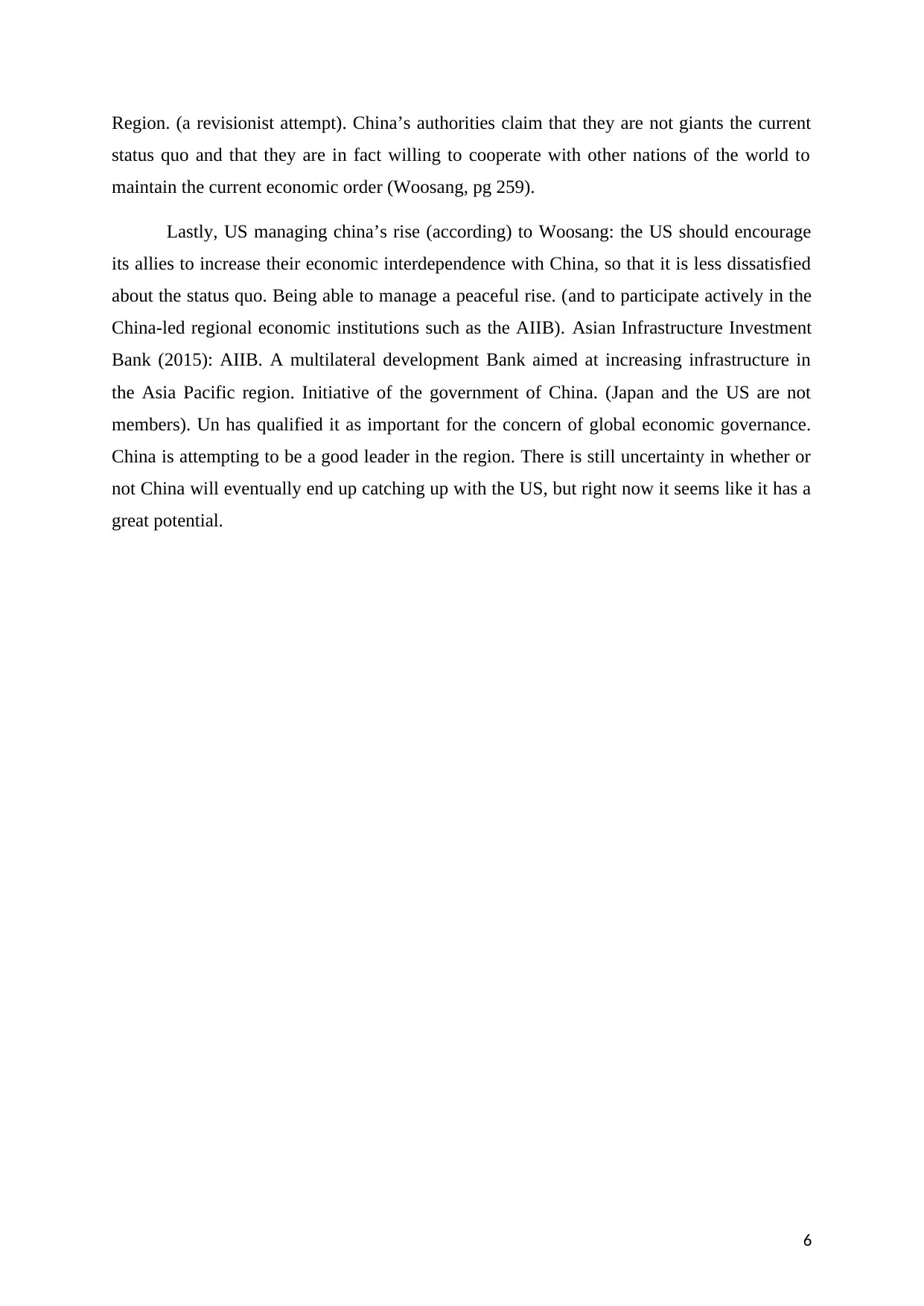
Region. (a revisionist attempt). China’s authorities claim that they are not giants the current
status quo and that they are in fact willing to cooperate with other nations of the world to
maintain the current economic order (Woosang, pg 259).
Lastly, US managing china’s rise (according) to Woosang: the US should encourage
its allies to increase their economic interdependence with China, so that it is less dissatisfied
about the status quo. Being able to manage a peaceful rise. (and to participate actively in the
China-led regional economic institutions such as the AIIB). Asian Infrastructure Investment
Bank (2015): AIIB. A multilateral development Bank aimed at increasing infrastructure in
the Asia Pacific region. Initiative of the government of China. (Japan and the US are not
members). Un has qualified it as important for the concern of global economic governance.
China is attempting to be a good leader in the region. There is still uncertainty in whether or
not China will eventually end up catching up with the US, but right now it seems like it has a
great potential.
6
status quo and that they are in fact willing to cooperate with other nations of the world to
maintain the current economic order (Woosang, pg 259).
Lastly, US managing china’s rise (according) to Woosang: the US should encourage
its allies to increase their economic interdependence with China, so that it is less dissatisfied
about the status quo. Being able to manage a peaceful rise. (and to participate actively in the
China-led regional economic institutions such as the AIIB). Asian Infrastructure Investment
Bank (2015): AIIB. A multilateral development Bank aimed at increasing infrastructure in
the Asia Pacific region. Initiative of the government of China. (Japan and the US are not
members). Un has qualified it as important for the concern of global economic governance.
China is attempting to be a good leader in the region. There is still uncertainty in whether or
not China will eventually end up catching up with the US, but right now it seems like it has a
great potential.
6
Paraphrase This Document
Need a fresh take? Get an instant paraphrase of this document with our AI Paraphraser
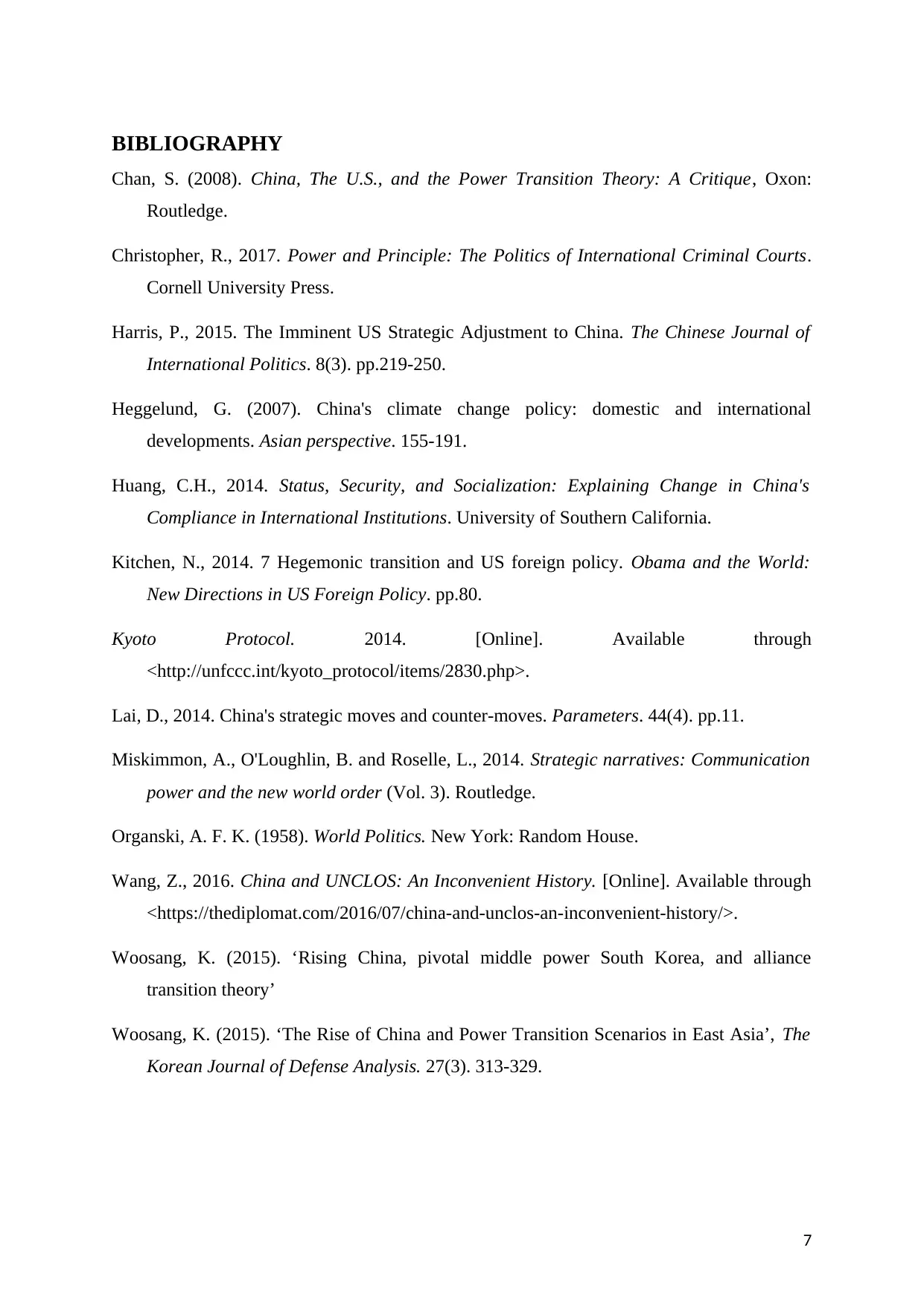
BIBLIOGRAPHY
Chan, S. (2008). China, The U.S., and the Power Transition Theory: A Critique, Oxon:
Routledge.
Christopher, R., 2017. Power and Principle: The Politics of International Criminal Courts.
Cornell University Press.
Harris, P., 2015. The Imminent US Strategic Adjustment to China. The Chinese Journal of
International Politics. 8(3). pp.219-250.
Heggelund, G. (2007). China's climate change policy: domestic and international
developments. Asian perspective. 155-191.
Huang, C.H., 2014. Status, Security, and Socialization: Explaining Change in China's
Compliance in International Institutions. University of Southern California.
Kitchen, N., 2014. 7 Hegemonic transition and US foreign policy. Obama and the World:
New Directions in US Foreign Policy. pp.80.
Kyoto Protocol. 2014. [Online]. Available through
<http://unfccc.int/kyoto_protocol/items/2830.php>.
Lai, D., 2014. China's strategic moves and counter-moves. Parameters. 44(4). pp.11.
Miskimmon, A., O'Loughlin, B. and Roselle, L., 2014. Strategic narratives: Communication
power and the new world order (Vol. 3). Routledge.
Organski, A. F. K. (1958). World Politics. New York: Random House.
Wang, Z., 2016. China and UNCLOS: An Inconvenient History. [Online]. Available through
<https://thediplomat.com/2016/07/china-and-unclos-an-inconvenient-history/>.
Woosang, K. (2015). ‘Rising China, pivotal middle power South Korea, and alliance
transition theory’
Woosang, K. (2015). ‘The Rise of China and Power Transition Scenarios in East Asia’, The
Korean Journal of Defense Analysis. 27(3). 313-329.
7
Chan, S. (2008). China, The U.S., and the Power Transition Theory: A Critique, Oxon:
Routledge.
Christopher, R., 2017. Power and Principle: The Politics of International Criminal Courts.
Cornell University Press.
Harris, P., 2015. The Imminent US Strategic Adjustment to China. The Chinese Journal of
International Politics. 8(3). pp.219-250.
Heggelund, G. (2007). China's climate change policy: domestic and international
developments. Asian perspective. 155-191.
Huang, C.H., 2014. Status, Security, and Socialization: Explaining Change in China's
Compliance in International Institutions. University of Southern California.
Kitchen, N., 2014. 7 Hegemonic transition and US foreign policy. Obama and the World:
New Directions in US Foreign Policy. pp.80.
Kyoto Protocol. 2014. [Online]. Available through
<http://unfccc.int/kyoto_protocol/items/2830.php>.
Lai, D., 2014. China's strategic moves and counter-moves. Parameters. 44(4). pp.11.
Miskimmon, A., O'Loughlin, B. and Roselle, L., 2014. Strategic narratives: Communication
power and the new world order (Vol. 3). Routledge.
Organski, A. F. K. (1958). World Politics. New York: Random House.
Wang, Z., 2016. China and UNCLOS: An Inconvenient History. [Online]. Available through
<https://thediplomat.com/2016/07/china-and-unclos-an-inconvenient-history/>.
Woosang, K. (2015). ‘Rising China, pivotal middle power South Korea, and alliance
transition theory’
Woosang, K. (2015). ‘The Rise of China and Power Transition Scenarios in East Asia’, The
Korean Journal of Defense Analysis. 27(3). 313-329.
7

8
⊘ This is a preview!⊘
Do you want full access?
Subscribe today to unlock all pages.

Trusted by 1+ million students worldwide
1 out of 9
Your All-in-One AI-Powered Toolkit for Academic Success.
+13062052269
info@desklib.com
Available 24*7 on WhatsApp / Email
![[object Object]](/_next/static/media/star-bottom.7253800d.svg)
Unlock your academic potential
Copyright © 2020–2026 A2Z Services. All Rights Reserved. Developed and managed by ZUCOL.

